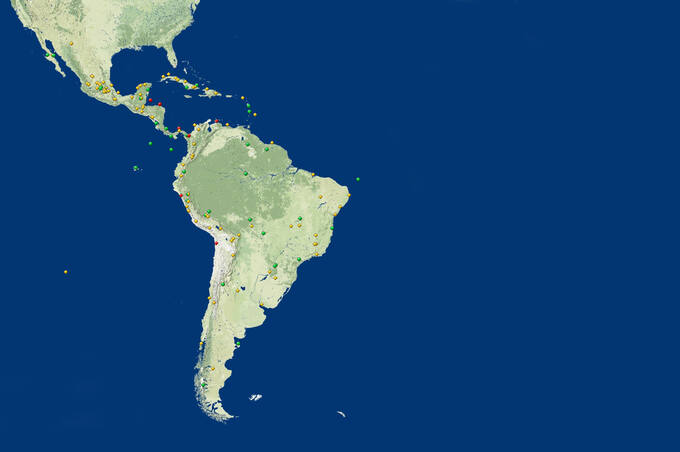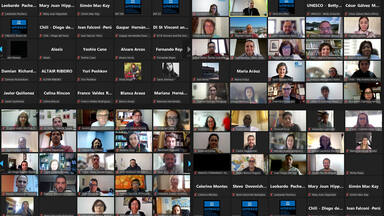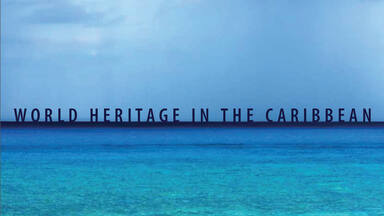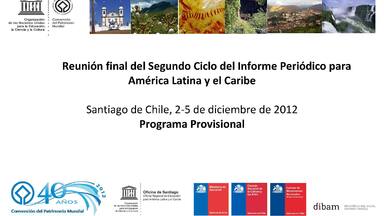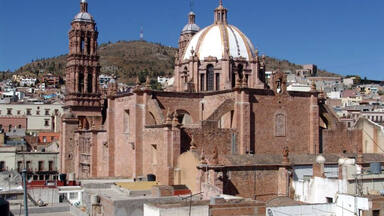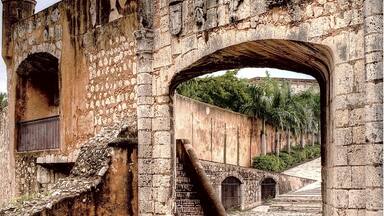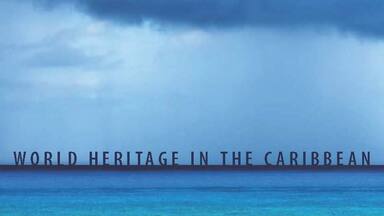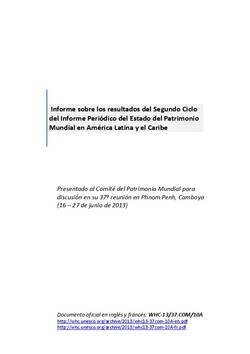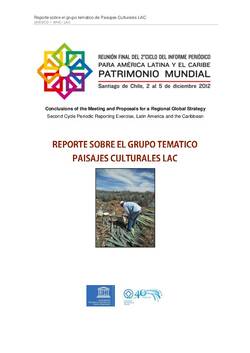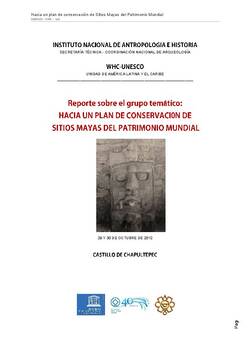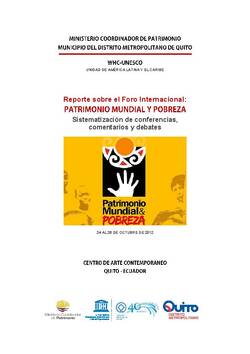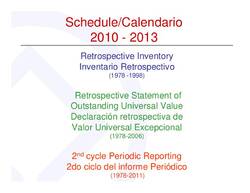The preliminary process was implemented in cooperation with some Regional Offices (Lima, Quito, Montevideo, Guatemala, Costa Rica and Havana), and some of the Category 2 Centres approved by the General Conference in October 2009 (35 C/20).
Final Report
Synthesis and analysis of the second cycle of Periodic Reporting in Latin America and Caribbean (LAC) submitted in accordance with the Decision 36 COM 10C.
Meetings
With the purpose of achieving the objectives of the World Heritage Committee, and bearing in mind that the official launch of the Second Cycle of Periodic Reporting is in 2011, the LAC Unit of the World Heritage Centre (WHC) established the following timeline for 2009-2013:First series of meetings
The following sub-regional meetings held in 2010 and scheduled for 2011, included the participation of Focal Points of natural and cultural properties inscribed on the World Heritage List, site managers, Regional and national authorities, senior officials responsible for protecting and managing cultural and natural heritage sites in the sub-region, Advisory Bodies (ICOMOS, IUCN and ICCROM), in addition to the staff of the two Category 2 Centres and Regional Offices of UNESCO.The objectives of these meetings were:
- Develop the preparation of the Second Cycle of the Periodic Reporting Exercise;
- Discuss the programmes and activities to be implemented in the Region until 2013;
- Train managers and Focal Points to complete the Periodic Reporting Exercise questionnaire (Sections I and II);
- Discuss the drafting of the Retrospective Statement of Outstanding Universal Value;
- Inform participants of the Retrospective Inventory process;
- Establish thematic working groups;
- Create effective means of communication and exchange experiences and practices among experts;
- Promote and develop training programmes.
Regional meeting
Organization of a regional meeting (Argentina) for cultural and natural National Focal Points from the entire Region.Buenos Aires (Argentina) 26-28 November 2009.
Sub-regional meetings
Organization of three sub-regional meetings in 2010 and 2011 in three countries in the Region (Mexico , Brazil and Barbados). The National Focal Points will convene at each meeting together with the respective site managers, in charge of the properties inscribed on the List in each sub-region. The sub-regional meetings also aim to strengthen cooperation among State Parties, in order to create a solid platform for the exchange of technical and institutional development over the next three years.- Mexico and Central America meeting held in Zacatecas (Mexico) on 6-10 September 2010
- South America . Rio de Janeiro (Brazil), on 7 to 10 December 2010, at the Gustavo Capanema Palace - Portinari Hall and Hotel Francisco.
- Caribbean . Bridgetown (Barbados) on 6-8 April, 2011.
Second series of meetings
Organization of three sub-regional meetings between 2010 and 2012 in Mexico, Brazil and the Dominican Republic. National Focal Points and site managers in charge of the properties inscribed on the List of each sub-region attended the meeting. The sub-regional meetings also aimed to strengthen cooperation among State Parties in order to create a solid platform of exchange of technical and institutional information for the coming years.
Sub-regional meetings
- Mexico and Central America meeting was held in Zacatecas (Mexico) on 12-17 March 2012
- South America meeting was held in Ouro Preto (Brazil), on 9 to 11 February 2012
- Caribbean meeting was held in Santo Domingo (Dominican Republic) on 15-17 February 2012
Regional meeting
Santiago de Chile (Chile) 2-5 December 2012
Other meetings
Information meetings held with the Permanent Delegations of the countries participating in the meetings to ensure the coordination process.
In parallel with regional and sub-regional meetings, the WHC will support the discussions of organized thematic groups : Maya sites, Sustainability Indicators for Historical Areas, Cultural Routes and Religious Missions. Other topics for discussion are the following: mixed properties, legal advice and the Tentative List.
Target Groups
26 countries of the Latin America and Caribbean Region; National Institutions managing cultural and natural heritage, managers of properties inscribed on the World Heritage List (124 properties); Focal Points, Regional Office staff, Category 2 Centre staff, regional experts, representatives of ICOMOS, IUCN and ICCROM.
Working Areas
In this section of the platform, the World Heritage Centre aimed to provide an interactive space for the LAC community and participants of thematic groups created during the sub-regional meetings. Each group had a coordinator that was responsible for the launching, coordination and moderation of discussions.
Each thematic group was provided with an alert system to inform the participants and the World Heritage Centre when a new discussion has been opened or when documents have been uploaded.
Thematic Groups
The following links will take you to the Thematic Group you participated during this process:
Zacatecas (Mexico and Central America)
Río de Janeiro (South America)
Bridgetown (Caribbean)
Partners

Decisions / Resolutions (5)
The World Heritage Committee,
- Having examined Document WHC/19/43.COM/10A,
- Recalling Decision 41 COM 10B.4, adopted at its 41st session (Krakow, 2017),
- Welcomes the progress made in the follow-up of the Second Cycle of Periodic Reporting for Latin America and the Caribbean;
- Expresses its appreciation to the States Parties of the region for their contribution to the monitoring undertaken by the World Heritage Centre in 2018 regarding the implementation of the Regional Action Plan for World Heritage in Latin America and the Caribbean (PARALC), 2014-2024, and encourages them to continue their efforts to address the priority actions and expected results identified in the PARALC, keeping the World Heritage Centre informed on significant advances or challenges;
- Strongly encourages the States Parties of the Caribbean to actively participate in the monitoring of the Action Plan for World Heritage in the Caribbean (PAC), 2015-2019, and contribute to the identification of new avenues and options for sub-regional cooperation in strengthening the implementation of the World Heritage Convention;
- Notes with appreciation the formulation of a biennial Work Plan 2018-2020 by the Lucio Costa Centre for Capacity Building on Heritage Management (C2C-LCC), Category 2 Centre under the auspices of UNESCO, for the implementation of capacity-building and other training activities in the framework of the sub-regional Action Plan for World Heritage in South America 2015-2020 (PAAS), and also strongly encourages the Category 2 Centre to continue its implementation of this agenda, in cooperation with the World Heritage Centre, and support other relevant activities related to World Heritage among its member countries;
- Further encourages the Regional Institute for World Heritage in Zacatecas in Mexico, Category 2 Centre under the auspices of UNESCO, to begin the implementation of its annual Work Plan developed for 2019, which includes important capacity-building activities prioritized within the framework of the Action Plan for World Heritage in Mexico and Central America (PAMAC), 2018-2023, and continue its collaboration with the World Heritage Centre in this regard;
- Reminds the States Parties of the region which have not already done so to submit their Retrospective Statements of Outstanding Universal Value by 1 February 2020 at the latest, as well as clarifications of boundaries by 1 December 2019 at the latest;
- Requests the World Heritage Centre to present a progress report on the implementation of the Action Plan for Latin America and the Caribbean at its 45th session in 2021.
The World Heritage Committee,
- Having examined document WHC-15/39.COM/10B,
- Recalling Decision 38 COM 10B.4 adopted at the 38th session (Doha, 2014);
- Takes note of the progress accomplished in the follow-up activities of the second cycle of the Periodic Reporting for Latin America and the Caribbean and encourages the States Parties of the region to continue their efforts in the implementation of its recommendations;
- Notes with appreciation the elaboration of the two sub-regional Action Plans for the Caribbean and for South America;
- Further notes with appreciation the support of the Government of Peru for the organization of the sub-regional meeting for the elaboration of the World Heritage Action Plan for South America (Cuzco, 5 to 7 May 2015);
- Encourages Central American States Parties to work in close coordination with the World Heritage Centre to organize a meeting for the establishment of a sub-regional Action Plan with the participation of all stakeholders;
- Encourages Mexico and Brazil to continue their efforts in view to consolidate the establishment of the UNESCO category 2 centres for World Heritage in Zacatecas (Mexico) and in Rio de Janeiro (Brazil);
- Reminds States Parties which have not already done so to submit their Retrospective Statements of Outstanding Universal Value by 1 February 2016 at the latest, as well as clarifications of boundaries by 1 December 2015 at the latest;
- Takes note that, in conformity with Decision 38 COM 10B.4, the World Heritage Centre will provide a report on the progress made in the implementation of the regional and sub-regional Action Plans at its 40th session in 2016.
The World Heritage Committee,
1. Having examined document WHC-13/37.COM/10A,
2. Recalling Decisions 32 COM 11D, 34 COM 10B.2, 35 COM 10B and 36 COM 10C adopted respectively at its 32nd (Quebec City, 2008), 34th (Brasilia, 2010), 35th (UNESCO, 2011) and 36th (Saint Petersburg, 2012) sessions,
3. Expresses its sincere appreciation to the States Parties from Latin America and the Caribbean for their efforts in preparing and submitting their Periodic Reports and thanks especially all focal points and site managers for their effective participation and commitment;
4. Notes with satisfaction that all the 32 States Parties from Latin America and the Caribbean have participated actively in the Periodic Reporting exercise and 29 Section I questionnaires and 122 Section II questionnaires were successfully submitted;
5. Reiterates its satisfaction that at the moment of the launching of the second cycle, 116 draft retrospective Statements of Outstanding Universal Value were submitted and welcomes the final submission of 66 Statements for adoption by the World Heritage Committee at its 37th session;
6. Thanks the authorities of Argentina, Barbados, Brazil, Chile, Dominican Republic and Mexico for their support in successfully organizing regional and sub-regional meetings, in collaboration with the World Heritage Centre and UNESCO field offices;
7. Takes note of the successful use of the special electronic platform as an indispensable tool in providing the comprehensive documentation, gathered in the World Heritage Centre database for future monitoring and follow-up of the Action Plan and acknowledges the importance of this tool in developing the thematic working groups and their related programmes;
8. Welcomes with satisfaction the synthesis report and endorses the proposal to develop the Action Plan to be submitted to the World Heritage Committee at its 38th session for evaluation;
9. Requests the World Heritage Centre to develop the above-mentioned Action Plan, in collaboration with the States Parties of the region, the Advisory Bodies, the focal points, site managers and the World Heritage related-Category 2 Centres in the region and other partners;
10. Also takes note of the significant progress made concerning the Retrospective Inventory for the region, both in terms of clarification of boundaries and minor boundary modifications and also requests the States Parties to continue participating actively in this regard, especially when clarifications or modifications of boundaries have been requested by the World Heritage Committee in relation to the evaluation of the state of conservation of the respective properties;
11. Also thanks the Government of Spain for financing the translation of the Report containing the results of the Second Cycle of the Periodic Reporting into Spanish, further requests the World Heritage Centre to widely disseminate the Report among all stakeholders in the region, encourages the publication of the report in the World Heritage Papers series and calls on the international community to support the request;
12. Decides that the significant modifications to boundaries and changes to criteria (re-nominations) requested by States Parties as a follow-up to the Second Cycle of the Periodic Reporting Exercise will not fall within the limit of two nominations per State Party per year imposed by Paragraph 61 of the Operational Guidelines , while they will still fall within the overall limit of forty-five complete nominations per year. This decision shall apply for the 1 February 2014 and 1 February 2015 deadlines for the Latin America and the Caribbean Region, after which time the normal limit established in Paragraph 61 will be resumed;
13. Encourages the States Parties and all other World Heritage partners and stakeholders, including the UNESCO Category 2 Centres in the Region, to actively cooperate and to take the necessary actions to follow-up, in a concerted and concrete manner, towards the development of the Action Plan;
14. Also encourages UNESCO Category 2 Centre for World Heritage of Zacatecas (Mexico) and the UNESCO Category 2 Centre Lucio Costa of Rio de Janeiro (Brazil) for heritage management, when appropriate, to coordinate their activities and the development of learning tools in Portuguese and Spanish to implement the capacity-building strategy and associated programmes, also welcomes the establishment of an observatory for heritage management foreseen in Brazil, and calls for a close cooperation with the Caribbean Capacity building Programme (CCBP);
15. Recognizes the valuable role played by local communities, including indigenous peoples, in the management of cultural and natural heritage properties and further encourages programmes at Latin America and the Caribbean World Heritage properties to also focus on the active involvement and participation of the local communities in their implementation and derivation of direct benefits;
16. Also calls on the States Parties to cooperate with technical and financial resources at the national level to implement the Action Plan, and on the World Heritage Centre and the Advisory Bodies to provide support for its implementation.
Read more about the decisionThe World Heritage Committee,
1. Having examined Document WHC-12/36.COM/10C,
2. Recalling decisions 28 COM 16, 7 EXT.COM 5E, 29 COM 5, 30 COM 11E, 32 COM 11D, 34 COM 10B.2 and 35 COM 10B adopted at its 28th (Suzhou, 2004), 7th extraordinary (UNESCO, 2004),29th (Durban, 2005), 30th (Vilnius, 2006), 32nd (Quebec City, 2008), 34th (Brasilia, 2010) and 35th (UNESCO, 2011) sessions, respectively,
3. Acknowledges the information provided on the progress made in the implementation of the second cycle of the Periodic Reporting exercise in the Latin America and the Caribbean Region (LAC) and commends the States Parties for their efforts to achieve objectives in accordance with the approved calendar;
4. Commends the States Parties of the LAC Region for their active involvement and commitment to the Periodic Reporting exercise;
5. Thanks the States Parties of Dominican Republic, Brazil and Mexico for their financial and in-kind contributions to the organization of sub-regional meetings;
6. Welcomes the financial collaboration for the Periodic Reporting exercise provided by the Spanish Funds-in-Trust for World Heritage, Category 2 Centres, States Parties and Advisory Bodies, and encourages them to continue to provide assistance for the implementation of the process;
7. Takes note of the progress made by the Qhapaq Ñan project, coordinated by the World Heritage Centre, and for the fruitful cooperation between national institutions from the various States Parties to develop it further as a best practice for other transnational and serial nominations, as requested by Decision 31 COM.12B;
8. Requests the States Parties of the Latin America and the Caribbean Region to complete and submit the Periodic Reporting questionnaires to the World Heritage Centre by 31 July 2012;
9. Also requests the World Heritage Centre to submit a final report on the results of the Second Cycle of the Periodic Reporting exercise for Latin America and the Caribbean for examination by the World Heritage Committee at its 37th session in 2013.
Read more about the decisionThe World Heritage Committee,
1. Having examined Document WHC-07/31.COM/11D.1,
2. Recalling Decisions 25 COM VII.25-27 adopted at its 25th session (Helsinki, 2001), 7 EXT.COM 5 and 7 EXT.COM 5A.1 adopted at its 7th extraordinary session (UNESCO, 2004), 29 COM 11.A adopted at its 29th session (Durban, 2005), 30 COM 11G adopted at its 30th session (Vilnius, 2006);
3. Recognizing the range of benefits for the World Heritage community of the new approach for Section II of the Periodic Reporting questionnaire proposed by the "Working Group on the simplification of the Periodic Reporting questionnaire and setting up of indicators" (the Working Group);
4. Welcomes the new format for Section II as presented in Document WHC-07/31.COM/INF.11D.1;
5. Requests the World Heritage Centre and the Working Group to develop a new format for Section I, incorporating the lessons learnt from the revision of the Section II questionnaire and to finalize both Sections I and II of the revised questionnaire and decides to allocate USD 75,000 from the World Heritage Fund for these activities;
6. Requests the World Heritage Centre to develop a Web-based application of the revised questionnaire as found in WHC-07/31.COM/INF.11D.1 and decides to allocate USD 50,000 from the World Heritage Fund for this task;
7. Recognizing the pivotal importance of Statements of Outstanding Universal Value in all World Heritage processes, urges States Parties, in cooperation with the World Heritage Centre and the Advisory Bodies, to prepare all missing Statements of Outstanding Universal Value for properties in their territory before the launching of the second cycle of Periodic Reporting in their Region and decides to allocate USD 10,000 from the World Heritage Fund to the Advisory Bodies to participate in the revision of the Statements of Outstanding Universal Value for the Arab States Region;
8. Requests the World Heritage Centre to ensure it has adequate capacity and resources to continue the Retrospective Inventory as the basis to prefill the questionnaire at the outset of the Second cycle of periodic reporting in each region;
9. Acknowledges the importance and complexity of adopting a consistent approach for indicators for World Heritage properties and requests the World Heritage Centre to prepare a working document on this issue to be presented at its 32nd session in 2008;
10. Invites States Parties wishing to participate in the Field Testing of the revised questionnaire to contact the World Heritage Centre before 30 September 2007.
Read more about the decision